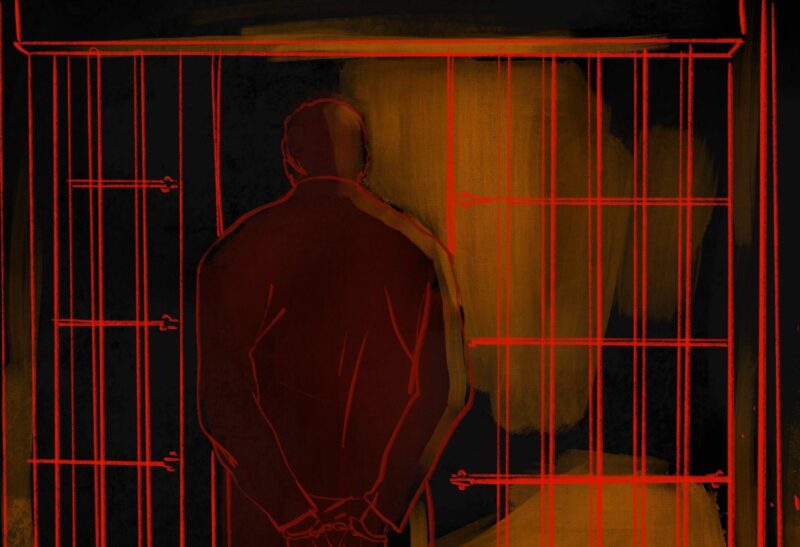
This article was originally published on
jam-news.net
***
During the Second World War, the small but proud Casablanca – the main port city of a small but proud Morocco – was the center of gravity for the most varied emigrants and political refugees. People went there fleeing fascism, in order to continue onwards to free countries. And this was where a romantic story unfolded, with Humphrey Bogart and Ingrid Bergman in the main roles.
Until recently, Tbilisi was just such a Casablanca for many Azerbaijanis.
A Home Away From Home
According to Reporters Without Borders, Azerbaijan is in 162nd place in its freedom of speech ranking.
Local human rights activists say that the number of political prisoners is no less than one hundred people, and has remained such since 2013 because of ‘personnel turnover’: those newly convicted take the place of those who were set free after a ‘letter of apology’ or serving their sentence.
Human rights activists say that the traditional reasons for arrests include participation in an unsanctioned rally, social activism, journalistic investigation and critiquing the government in social networks.
Official charges might be things like distributing narcotics, spying, crimes against the state, and calls for unrest.
Each person in the ‘at-risk group’ has their own plan of action in the case of pressure. This usually involves either leaving a ‘dangerous profession’ or struggling to the end, with prison bunks and a case in the European Court down the road.
One more alternative is to flee. And the ‘default’ country to flee to is Georgia.
Azerbaijanis say that here “you aren’t afraid of the police when you pass by them”, “you can say the president’s name without whispering”, and “it’s like you took time off from prison”.
Tbilisi is the Caucasus’s Casablanca, an island of freedom and a waystation before moving onwards for those considered undesirable ‘elements’ by the Azerbaijani government. Over the past years several dozen Azerbaijanis have come here, fearing potential arrest.
But just recently the situation began to change.
A Threat for Georgia
“It sometimes happens that they’ll openly follow you a whole day, and then slide photographs under the door showing where you were and what you did”, says Tbilisi political émigré Afgan Muhtarli, describing his life.

Afgan Muhtarli worked for many years as a journalist in Azerbaijan. Muhtarly is well-known for his consistency in criticizing the government.
He once wrote an investigative report on how the Ministry of Defense allocates money, and where tinned meat and other food products disappear to. Soon after this he had to move to Tbilisi.
“Over the last six or seven months they’ve been trying to push us – Azerbaijani political activists, journalists, and human rights activists who have moved to Georgia – out of here,” explains Muhtarli.
“Previous to this, we lived, worked, and met with our colleagues with no problem. But now, they’ve begun refusing to extend our residence permits. I, the journalist Leyla Mustafayeva, political activists Gyunel Movlud and Haji Hajiyev, and many others, have all encountered these sorts of problems.”
At the end of last year, denials began being issued en masse to requests for extension of residence permits. The responsible government agency, the Ministry of Internally Displaced Persons from the Occupied Territories, Accommodation and Refugees, would issue the standard explanation in an accompanying letter: “contravention of Georgia’s interests”, “posing a threat to public safety”.
“But they don’t say precisely what threat we pose”, says Mukhtarli, adding that both he and a colleague of his were summoned more than once to various national security agencies.
There are several dozen people like Afgan in Tbilisi, and his story is merely the tip of the iceberg.
The absolute majority of his colleagues with whom we spoke also told of surveillance and threats, but declined to give their names. Sometimes they simply fear to exacerbate the situation, other times they fear for relatives that have remained in Azerbaijan. The Georgian police take no action in response to their complaints, and sometimes state directly that “you are working against the interests of Georgia”.
Dashgin Aghalarli is a member of the opposition party Musavat, and left Azerbaijan in 2014. Soon after this he was put on the wanted list for allegedly not paying his taxes.
In November, 2014 he was arrested in Georgia, where Aghalarli spent six months in a pre-trial detention center until he was freed by local human rights activists. Only in the beginning of 2017 did he receive political asylum in Georgia. And already by the end of March the ministry appealed this decision and he was stripped of this status.
In contrast to most, Aghalarli doesn’t fear to talk with the press, since he is in a desperate situation and broad publicity is his last line of defense. If he doesn’t leave Georgia by the end of May, he will be deported to Azerbaijan where he is threatened with arrest.
Are Petroleum and Gas to Blame?
What makes the Georgian government put pressure on Azerbaijani political emigres?
Many of them believe that Georgia is economically dependent on Azerbaijan, and that the Azerbaijani leadership is using this as an instrument for pressure.
The State Oil Company of Azerbaijan (SOCAR) is the largest taxpayer in Georgia, and supplies it with petroleum and gas.
The explanation that Georgia is putting pressure on dissidents because Azerbaijan is putting pressure on Georgia is indirectly confirmed by a series of angry publications on one of the Azerbaijani pro-government sites, where rebukes are addressed at Georgia for not handing over political refugees to Azerbaijan. It asserts that Georgia is double-crossing Azerbaijan, on which it is economically dependent. And as if as an aside, it reminds readers that “about 300 thousand Azerbaijanis are living on what are historically their native lands in Georgia”.
The only one to receive asylum
Yet another character in the new Casablanca is human rights activist Vidadi Iskenderli, who is to date the only Azerbaijani political émigré to receive asylum in Georgia.
According to Iskenderli, he was also forced to endure pressure and threats at first.
He was often followed in a very demonstrative way, and once hit in the head. The second time, his family was threatened, and the third time he had a pistol waved in his face, accompanied by the demand that he cease criticizing the Azerbaijani government.
“I was relaxing with my wife and daughter at Lisi Lake in Tbilisi. The moment I left, they were approached by two guys who said, ‘Your husband clearly hasn’t come to his senses. Well, watch out’”, says Iskenderli.
“The Georgian government can’t protect me, but it won’t admit this officially”, he says. “I want for it to admit this, so that I can turn to other countries that can guarantee my safety and the safety of my family”.
The struggle against the underground
As part of the struggle against the “Azerbaijani underground”, in April 2017 in Tbilisi, a rally was held by several local Azerbaijanis against media outlet Meydan TV. The organizers asserted that Meydan TV is detrimental to Georgian – Azerbaijani relations.
MeydanTV is an online resource that was recently blocked in Azerbaijan by court decision. The majority of journalists contributing to Meydan TV have for several years already been among those on Azerbaijan’s stop-list, meaning they are official banned from leaving the country. Additionally, Meydan TV correspondents have, on several occasions, been arrested, detained, and questioned.
Workers for Meydan TV that manage to leave Azerbaijan often come to Tbilisi. On April 19 one of them, the political emigrant Jamal Ali, was not permitted to enter Georgia.
“They didn’t explain anything to me at the airport, they just sat me on a return flight to Istanbul and further on to Berlin”, he says. “When this happened, my greatest fear was that they were sending me to Baku, and not Berlin.”
A pro-government site in Azerbaijan wrote about this incident: “But why was he not detained? And why was he not handed over to Azerbaijan? If the Georgian side provided Azerbaijan with a similar request, how would Baku have acted?! Do the Tbilisi authorities really not know this?!”
That same article mentions by name nearly all the political emigres living in Tbilisi, and all of them are insultingly branded as traitors to their motherland and opposition conspirators.
JAMnews requested commentary from several human rights organizations that are involved with this topic.
The office of the official, government human rights defender, the Georgian public defender, responded as follows:
“We are studying the cases of several citizens of Azerbaijan, but not all of them are connected with receiving residence permits or political asylum. In the majority of cases, the basis for refusing to provide a residence permit or political asylum is connected with state security, which is first and foremost connected with secret materials, which we cannot discuss.”
Natia Tavberidze, a representative of the NGO Human Rights House Tbilisi, has been providing legal help to Azerbaijani political and civic activists since 2014. She said that at present around 90 people have come to them for help. This number includes not just the activists themselves, but also their family members.
According to Tavberidze, nobody has yet attempted to interfere with the organization’s work. Tavberidze says that so far there is no precedent for deporting Azerbaijani activists from Georgia back to Azerbaijan.
Nestan Londaridze, a lawyer handling the cases of Azerbaijani citizens in Georgia, said that court decisions to deny a residence permit to citizens of Azerbaijan may be based, more often than not, on conclusions drawn by the counter-terrorism center under the state security service of Georgia. This information is classified and lawyers can’t look at it.
“There was an instance where, during the court proceedings, we guessed based on the judge’s face that he was reading a document from the counter-terrorism center. The court pronounces decisions based on materials that are not accessible to us”, Nestan Londaridze told JAMnews.
JAMnews also approached the Ministry of Refugees and Accommodation of Georgia with a question about the reasons why citizens of Azerbaijan were refused residence permits in several concrete instances. We wanted to know what the ministry means when it speaks of a threat to Georgia’s security that is supposedly posed by several Azerbaijani activists.
However, despite multiple promises, in the end the agency announced that, in according with Georgian legislation, such information is confidential and cannot be provided.
JAMnews turned to the State Security Service of Georgia with a request to confirm that the organization is providing courts and other state structures with secret materials on citizens of Azerbaijan. We also wanted to receive an answer to the question of whether it was discovered that concrete activists had broken the law or posed concrete threats to security. At the time of publication we have yet to receive a response.
Fear

The following was said by human rights activist and ex-head of the Azerbaijani Women’s Crisis Center, Metanet Azizova, about the trip from Baku to Tbilisi after being questioned at the Prosecutor General’s Office in Azerbaijan:
“Have you heard the phrase ‘living fear’? I experienced it. This fear is impossible to convey in words. When we were stopped on the road by the traffic police, I thought this is it, this is the end. When, at the border, I was stopped by a plainclothes officer, I thought this is the end. When, in the morning, I called home to Baku from Tbilisi, and I was told they had come to do a search, I was horrified, understanding what it was I’d managed to escape. All my feeling was concentrated in one thing: fear. And only later came despair, ambiguity, and understanding that I needed to save myself and my family.
But that was in 2014. At that time, there was support and help. Today, those who have remained in Georgia and couldn’t leave for Europe are in a swamp of unresolved problems”.



